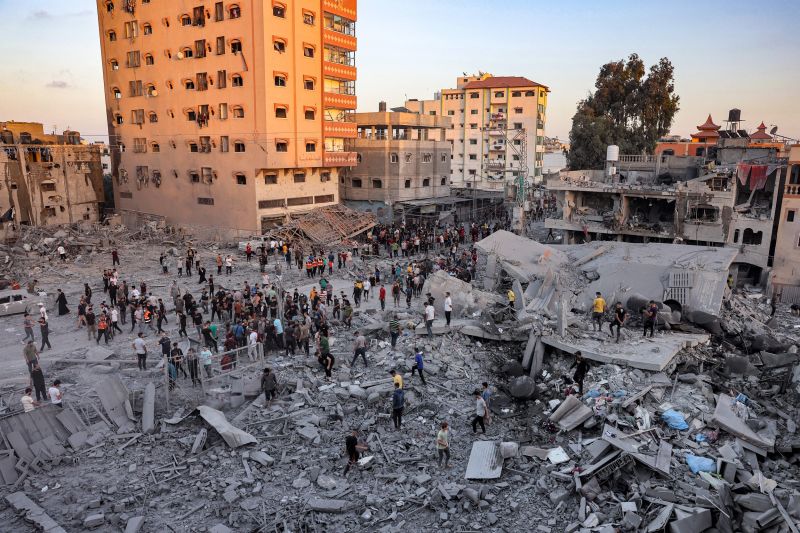
UN rights chief says both Israel and Hamas have committed war crimes
Both Hamas and Israel have committed war crimes in the past month, the United Nations human rights chief said, as thousands of Palestinians fled south amid Israel’s intensifying offensive against the Islamist militant group.
“The atrocities perpetrated by Palestinian armed groups on October 7 were heinous, brutal and shocking, they were war crimes – as is the continued holding of hostages,” said Volker Türk, the UN High Commissioner for Human Rights.
“The collective punishment by Israel of Palestinian civilians amounts also to a war crime, as does the unlawful forcible evacuation of civilians,” he added.
Israel declared war on Hamas on October 7 after militants killed 1,400 people in Israel and kidnapped about 240 others, according to the Israel Defense Forces (IDF).
The ensuing Israeli assault on Gaza has plunged the strip into crisis, with mass displacement and severe shortages of food, water, fuel and medical supplies.
The IDF has repeatedly called on civilians to move to the southern half of the strip to avoid the fighting, and has opened daily evacuation corridors to allow them to do so, as it intensifies attacks on Hamas in Gaza City and northern Gaza, saying it would strike the militants “wherever necessary.”
That has caused a growing exodus in the past week of Palestinians fleeing south; on Wednesday thousands of people, including women, children and the elderly, traveled miles on foot along the evacuation corridor announced by the IDF.
Speaking Wednesday, Türk urged both sides to agree to a ceasefire to allow the delivery of aid to Gaza, the release of hostages by Hamas, and “the political space to implement a durable end to the occupation.”
“Even in the context of a 56-year-old occupation, the current situation is the most dangerous in decades faced by people in Gaza, in Israel, in the West Bank but also regionally,” he said.
The Israeli military has pushed back against accusations of war crimes, saying its strikes on Hamas targets followed international law and sought to minimize civilian casualties.
Israel’s attacks have killed at least 10,515 people and injured more than 26,000 others in Gaza since the war began, according to a Wednesday report by the Palestinian Ministry of Health in Ramallah, drawing from sources in the Hamas-controlled enclave.
In pictures: Israel at war with Hamas
Türk delivered his comments after visiting the Rafah crossing on the Gaza-Egypt border – the only border crossing not controlled by Israel. In recent weeks, it has been opened to allow the limited entry of aid, and the exit of foreign nationals and severely injured Palestinians from Gaza.
He said the Rafah crossing is a symbolic lifeline for the more than 2 million people in Gaza and called for more aid to be delivered, saying: “The lifeline has been unjustly, outrageously thin.”
“In Rafah I have witnessed the gates to a living nightmare,” he said in a statement. “A nightmare where people have been suffocating, under persistent bombardment, mourning their families, struggling for water, for food, for electricity and fuel.”
The main UN agency operating in Gaza said Thursday it was able to deliver medical supplies to Al-Shifa hospital, Gaza’s largest medical facility, “despite huge risks to our staff and health partners due to relentless bombardments.”
The UN Relief and Works Agency (UNRWA) described the conditions in the hospital as “disastrous,” saying there were almost two patients for every bed.
Hospital wards are overflowing, with patients being treated on the floor, and tens of thousands of displaced Gazans seeking shelter in the facility’s parking lots and yards, it said.
Aid organizations have also highlighted the dangers of delivering supplies within Gaza. The International Committee of the Red Cross (ICRC) on Tuesday said its convoy had come under fire but did not apportion blame. Two trucks were damaged in the attack and a driver sustained minor injuries, the ICRC said.
The Palestine Red Crescent Society (PRCS) later said Israel was responsible for firing on the convoy.
